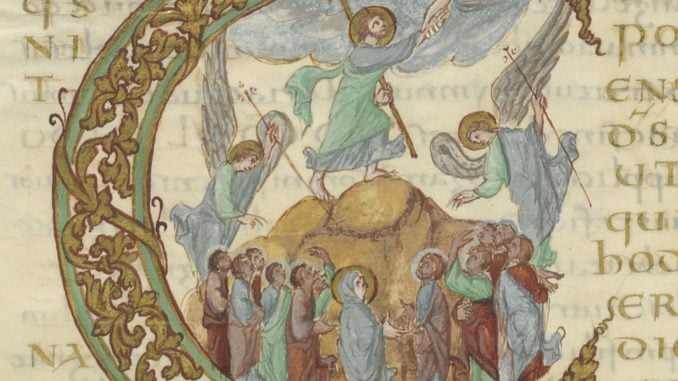
Whether you go to church or not, everyone knows Christmas and Easter and its Christian roots: Christmas remembers Jesus’ birth and Resurrection is self-explanatory. You don’t have to believe the stories to be part of the festivity. Daniel Dennet, an atheist philosopher, has little tolerance for religion but sings “O Come All Ye Faithful” by heart in Latin on Christmas Eve. But there is another important holy day in the Christian calendar which has not made the same leap into the secular world. Ascension day. Actually, Thursday (5/25) is Ascension day and the fact that most are clueless about it, including Christians, is evidence of its cultural irrelevance. Which is ironic because in the Apostle’s Creed, a basic statement of faith for Christianity, talks about ascension right smack in the middle with the Christmas and Easter story. In fact, the ascension story gives Christianity its unique texture, its missional energy and amazing adaptability, because it became an antidote to exceptionalism, the inward pressure of all institutions, and it might be the antidote for our day.The basic story of ascension is that Jesus, after resurrection and spending 40 days with his closest friends, said farewell and disappeared. It sounds fishy to secularists, as it did to me when I was working through the Christian story for myself. It seems so convenient for the first followers to reply, “Well Jesus disappeared,” when seekers asked to see the resurrected Jesus with their own eyes. But here is a historical anomaly: It was only after this story that the first followers became missionaries, going out sharing the story of Jesus as a story that mattered to everyone they met. This is because the story of ascension rapidly scattered this new movement, for it neither had a tomb or a body to point to and say this is ground zero. With Jesus disappearing, Jerusalem could not claim for itself an exceptional status. Whether you believe or not. You’ve got to appreciate this brilliant move.Lamin Sanneh, a professor of world Christianity at Yale Divinity School and an expert on Christian and Muslim history, credits this quality of non-exceptionalism that allowed Christianity to grow, adapt, and express itself within an ever-changing array of cultural and historical contexts. This non-exceptionalism is appreciated when contrasted to Islam, which remains a faith rooted in specific geographical places, Mecca and Medina, and to a single language, Arabic. Translations of the Quran into other languages are not considered genuine.Every institution gravitates towards exceptionalism because institutions think survival relies on special status. The danger of exceptionalism is that it leads to exceptions from criticism. Preservation becomes petrification.James Comey, the recently fired FBI director, wrote his senior thesis contrasting the Christian political philosophy between Reinhold Niebuhr and Jerry Falwell. Falwell, creator of the Moral Majority in 1979, believed in American exceptionalism, the City on a Hill with Manifest Destiny to spread Democracy as its divine prerogative. John L. O’Sullivan coined it in his column in the New York Morning News on Dec. 27, 1845, to argue for the right for America to take Oregon saying America’s “claim is by the right of our manifest destiny to overspread and to possess the whole of the continent which Providence has given us.” Exceptionalism is uncritical.Comey sides with Niebuhr who says Christians have the obligation to love their country but always with a critical eyes because a society left to itself is “immoral.” There is no exceptionalism to Niebuhr’s thinking of America or any society. Only that critical perspective can save an organization from crumbling on itself.Comey, when he was the director, kept a document from the bureau’s archives on his desk, an application by his predecessor, J. Edgar Hoover, to the Justice Department to wiretap Martin Luther King, Jr. Why? “The entire application is five sentences long, it is without fact or substance, and it is predicated on the naked assertion that ‘there is Communist influence in the racial situation,” he explained in a speech at Georgetown University in February 2015. He required FBI agents to study this history with King then visit the King Memorial in Washington. “The reason I do those things,” he said, “is to insure that we remember our mistakes and that we learn from them.”Samuel Son is a teaching pastor in Raleigh.



